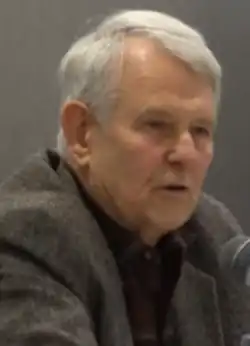John McClaughry
John McClaughry | |
|---|---|
 | |
| Member of the Vermont Senate from the Caledonia district | |
| In office 1989–1993 Serving with Joseph M. Sherman | |
| Preceded by | Gerald Morse |
| Succeeded by | Julius D. Canns |
| Member of the Vermont House of Representatives from the 26th district | |
| In office 1969–1973 Serving with Harry U. Lawrence | |
| Preceded by | W. Arthur Simpson |
| Succeeded by | Cola Hudson |
| Personal details | |
| Political party | Republican |
| Education | Miami University (AB) Columbia University (MA) University of California, Berkeley (MA) |
John McClaughry is an American author and politician. He served in the Vermont House of Representatives from 1969 to 1972 and the Vermont State Senate from 1989 to 1992.[1][2]
Early life and education
McClaughry grew up in Paris, Illinois.[3] In 1958, he earned an AB in physics and mathematics from Miami University. In 1960, he earned an MS in nuclear engineering from Columbia University. In 1963, he earned a MA in political science from University of California, Berkeley.[4] From 1962 to 1965, McClaughry spent time living as a hobo and hopped trains, traveling in boxcars about 5,000 miles across 19 states.[3]
Career
McClaughry moved to Washington, D.C., where he worked at the moderate Republican magazine Advance.[5] In 1968, John F. Osborne in The New Republic called McClaughry "a remarkable white Republican activist" who was working "to promote black opportunity and black control of black communities."[6] He moved to Vermont permanently in 1970.[5] In 1969, McClaughry was elected to a seat in the Vermont House of Representatives. He served until 1972.[1]
McClaughry served as a senior policy advisor in Ronald Reagan's presidential campaign of 1980. Afterwards, he served in the White House Office of Policy Development until March 1982.[7] McClaughry ran for senate in the 1982 United States Senate election in Vermont. He placed third in the Republican primary.[8] In 1989, McClaughry was elected to the Vermont State Senate where he served until 1992.[1]
In 1992, he was the Republican candidate for Governor of Vermont, ultimately losing to incumbent Democrat Howard Dean.[7] McClaughry had been the Town meeting day moderator in Kirby, Vermont, since 1967.[9][10][6] In 1993, McClaughry founded the Ethan Allen Institute. He served as president from 1993 to 2009, and as acting president in 2010, then vice president to retirement in 2023.[11]
Books
- Expanded Ownership (Sabre Foundation, 1972)
- with Frank M. Bryan, The Vermont Papers: Recreating Democracy on a Human Scale (Chelsea Green, 1989)
- A Better Path - From Welfare to Work (Ethan Allen Institute, 1993)[4]
- Promoting Civil Society Among the Heathen, Institute for Liberty and Community, 2013.
References
- ^ a b c Susteren, Dirk Van (November 24, 2013). "In This State: A thing or two you might not know about John McClaughry". VTDigger.
- ^ Bolles, Dan. "Riding the Rails With John McClaughry: Conservative Thought Leader, Politico, Hobo". Seven Days.
- ^ a b "Riding the Rails With John McClaughry: Conservative Thought Leader, Politico, Hobo". Seven Days.
- ^ a b "McClaughry, John. CV". policyexperts.org. Archived from the original on March 6, 2023. Retrieved February 13, 2023.
- ^ a b "Diminishing Democracy? At Kirby Town Meeting, the 18 Percent Rule". Seven Days.
- ^ a b "Vermont's Republican Radical". The American Conservative. February 14, 2014.
- ^ a b Van Susteren, Dirk (November 24, 2013). "In This State: A thing or two you might not know about John McClaughry". VTDigger.org. Vermont Journalism Trust. Retrieved March 9, 2015.
- ^ Broder, David S. (August 27, 1982). "GOP Primary in Vermont to Provide Early Test on Powers of Incumbency". The Washington Post. Retrieved February 13, 2023.
- ^ "Kirby Town Meeting Moderator Discusses Importance Of Town Meeting Day". WAMC. March 7, 2017.
- ^ "'Exercise In Social Solidarity': On Town Meeting Day In Kirby, Vt". Vermont Public Radio. February 22, 2021.
- ^ "Staff and Directors". Ethan Allen Institute. Archived from the original on November 8, 2016. Retrieved March 9, 2015.